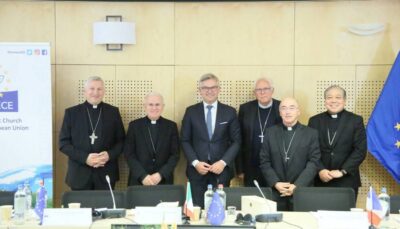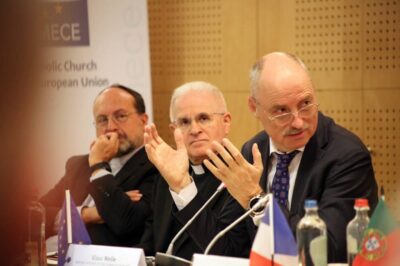Remarks by Christine Lagarde, President of the ECB, at the panel on the “Global Economic Outlook” at the 40th Annual G30 International Banking Seminar
Washington DC, 18 October 2025
Global imbalances have once again moved to the forefront of international debate.
The discussion has largely centred on China and the United States. But Europe, too, is now in the spotlight ‒ suspected of pursuing an “unfair” trade policy towards the United States.
There is no denying here that Europe is a major player in this debate.
Together, the euro area and China account for roughly half of the world’s current account surplus – about one-quarter each – while the United States represents around three-quarters of the global deficit.
But we need to explore under the headline numbers, which do not fully reflect the underlying economic reality in Europe – nor do they capture the adjustment that is already under way.
Europe’s role in global imbalances
There are three points that need clarifying.
First, among the three major economies, Europe is not a key source of global imbalances ‒ and its contribution has been steadily declining.
In a globalised trading system, bilateral balances never tell the whole story. But they do matter for the political economy of trade tensions.
It is therefore notable that the euro area’s largest surpluses are with the United Kingdom, non-euro area EU countries in central and eastern Europe, and economies such as Australia, Canada, Hong Kong, Mexico, Brazil, Türkiye and South Korea.
Neither China nor the United States is a major counterpart.
The euro area runs a deficit of almost €150 billion with China, which has widened by around 10% this year. Trade with the United States is broadly balanced: a goods surplus is offset by a services deficit – and much of both is driven by US multinationals.
According to our estimates, around 30% of our bilateral goods surplus reflects exports by European affiliates of US multinationals. Conversely, those same firms account for roughly 90% of our services deficit, particularly in intellectual property products.[1]
This is, for example, the case in the pharmaceutical sector, where European affiliates pay royalties for intellectual property originating in the United States while supplying finished products back to the US market.
Moreover, Europe’s overall current account surplus has been declining. It reached almost 4% of GDP in 2018, but by the first half of this year it had halved to 2.1%[2] and is projected to remain around that level.[3]
By contrast, trends in other major economies are going in the opposite direction.
China’s current account surplus has risen from 0.2% of GDP in 2018 to 3.7% in the first half of this year, while the US current account deficit has widened from 2.1% to 6% of GDP over the same period.[4]
Second, the historical drivers of Europe’s surplus are already fading ‒ unlike in other major economies.
Imbalances are not inherently negative. For instance, when imbalances are created by improved competitiveness driven by genuine productivity gains, they benefit everyone. But when they are sustained by distortionary policy choices rather than fundamentals, they risk becoming a zero-sum game.
Two main forces pushed Europe’s current account into surplus during the 2010s: strong export performance in global markets – partly driven by real exchange rate compression – and fiscal consolidation at home. But since the pandemic, both forces have been reversing.
Euro area exports are now increasingly under pressure, particularly with competition from China intensifying. Since the start of 2022, the euro area has seen a real appreciation of around 32% against China, driven by prices rising faster in Europe as well as a stronger nominal exchange rate.[5]
Fiscal policy will also play a more supportive role in the years ahead. This is especially true in countries such as Germany, where major military and infrastructure investments are under way. The average fiscal deficit in the euro area is expected to stand just over 3% of GDP over the next three years.
Policies in Europe are therefore contributing to rebalancing. This stands in sharp contrast to developments elsewhere.
In China, export growth has been strongest in sectors where domestic demand remains weak, suggesting that excess supply is being directed abroad rather than absorbed at home.
Meanwhile, the main driver of the global current account deficit is still the US fiscal position – and at present we are seeing little attempt to rein it in.
Third, what remains of Europe’s surplus can largely be explained by demographics.
Even though our surplus is declining, we should not expect it to disappear entirely. Europe’s ageing population is naturally leading to higher savings and lower investment.
According to IMF staff assessments, the current account gap – that is, the difference between the actual balance and the level justified by fundamentals such as demographics and appropriate policies – stood at around 1% of GDP in 2024.[6]
In other words, only about 1 percentage point of the euro area’s surplus could be considered “excessive” last year, and that surplus has since fallen further.
Responses to an imbalanced world
With all this in mind, I will draw three main conclusions.
First, coercive trade measures against Europe will not help resolve the United States’ external imbalances.
Tariffs do not sustainably reduce current account deficits, as they have complex effects on saving and investment decisions.[7] They can only be effective when used to encourage trading partners to remove distortionary policies that drive imbalances.
Europe is no longer a reasonable target for such a strategy. Insofar as distortionary policies once played a role, we have largely removed them. And the United States already faces very low tariffs when exporting to the EU.
Continuing to apply trade measures aggressively may even prove counterproductive. Europe is roughly twice as open to trade as the United States.[8] This means that constant trade policy volatility is more likely to raise uncertainty among European households and firms than among their US counterparts.
That uncertainty, in turn, could prompt higher precautionary savings, lower spending and therefore lower imports of US goods and services. The net effect could be to increase, rather than reduce, Europe’s trade surplus.
Our Consumer Expectations Survey shows that, in response to recent tariff-related concerns, around a quarter of consumers report switching away from US products, and roughly 16% say they have cut their overall spending.[9]
Second, the United States would gain more from pooling resources with its allies than trying to force activity back home.
The new Chinese restrictions on rare earths have fully revealed the threat of “weaponised dependencies”. We must work with trusted partners to reduce our exposures and share risks.
That is why the United States should view Europe’s strength in manufacturing as an asset.
The United States imports more than half a trillion dollars’ worth of goods from Europe each year. Most of these products are highly differentiated and difficult to substitute domestically, especially with the economy already operating at full capacity.
Europe can provide much of the manufacturing capacity that the United States needs and no longer wishes to rely on China for. The United States, in turn, can provide Europe with frontier technologies, helping us to reduce risky dependencies as well.
This is not “unfair trade”; it is free trade working as intended – the efficient use of our distinct industrial structures and comparative advantages, with no risk of exploitation if we remain true to our historical alliance.
The third conclusion I draw is that Europe should continue to pursue measures to strengthen domestic demand. This will make our economy more resilient and less exposed to external shocks.
The untapped potential of our Single Market offers a powerful margin of adjustment. ECB analysis indicates that an increase of just 2% in intra-euro area trade could fully offset the export losses to the United States that might result from current tariffs.
At the same time, with targeted policies such as preference schemes for European firms and close allies, our internal demand can serve as a lead market for developing those industries where greater strategic autonomy is needed.
Conclusion
To sum up, it is inaccurate to characterise Europe’s external surplus today as a key driver of global imbalances. It mainly reflects economic factors that are already reversing, and demographic realities that we cannot escape.
The world should view Europe as a stable and trusted partner ‒ one that is ready to do its part to ensure that free trade remains a win-win proposition.
This applies above all to the United States, where our historic relationship enables both our economies to develop their areas of comparative advantage, while avoiding inefficient reshoring policies where they are not needed.
We should leverage this partnership and deepen it in new areas, such as rare earths, rather than eroding it through hostile actions or rhetoric.
But if the United States continues to see Europe as an adversary in trade, and China continues to pursue distortionary policies, we have strategies we can pursue to shield our economy.
Most importantly, we must unlock the potential of our continent-sized Single Market and turn it into a far more dynamic source of demand for European companies.
We have the will – and the means – to do so.













